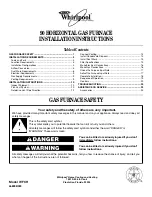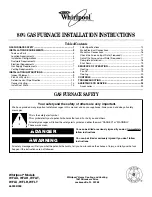
6
1.
Locate cabinet cutout location and cut hole per type of installation
being used.
2.
Install adapter by removing the large knockout from the rear of the
casing a
nd attach the 5” duct adapter or optional 5” to 4” inch
adapter.
3.
Fasten 5” duct to the adapter and to the back of the interior grill
and secure.
4.
On installations
with 1” or less space between 5” adapter and grill,
the grill can be inserting directly into the adapter to complete the
connection.
5.
Secure grill to cabinet by fastening with screws.
WARNING
FIRE OR EXPLOSION
Never check for leaks with an open flame. Turn on the gas and apply
soapy water or leak detect solution to all joints to see if bubbles are
formed.
PROPANE GAS CONNECTION
Propane Gas Pressure Test
The furnace and any individual shut-off valve must be
disconnected from gas supply piping system during any pressure
testing of system at test pressures of more than .5 PSI.
Before furnace is connected, piping systems are to be tested to
be leak free. The test must maintain air pressure of at
least 6” of
mercury or 3 PSI for at least 10 minutes.
The entire piping system is to be adjusted to and maintain a
pressure of 10” to 13” W.C. when all appliances are in operation.
Test gas connections for leakage with soapy water or a leak
detect solution.
If local codes allow the use of a flexible gas appliance connector,
always use a new listed connector. Do not use a connector which
has previously serviced another gas appliance.
1.
Connect gas line to the fitting located on the valve through hole in
top of casing or if supplied with an extended manifold at the rear
of the furnace.
2.
Be sure all male pipe threads, other than flare fittings, are treated
with a sealing compound resistant to the action of propane (LP)
gas. DO NOT put sealing compound on flare fittings
3.
Remove grommet plug from furnace. After inserting gas line
through gas plug and connecting to valve re-install gas plug this is
a required air seal.
4.
Insert gas line through grommet plug (DO NOT CUT GROMMET).
5.
Connect gas line inside furnace casing immediately ahead of gas
control valve or at the rear when extended manifold is supplied.
6.
Use two wrenches to hold brass fitting and flare nut when
tightening gas line to brass fitting. DO NOT twist valve assembly.
DO NOT twist valve assembly, torque fitting to 20-22 ft. lbs.
ELECTRICAL CONNECTIONS
WARNING
INJURY OR PROPERTY DAMAGE
Label all wires before disconnecting for servicing. Wiring errors can
cause improper and dangerous operation. Verify proper operation
after servicing.
Disconnect electrical power before servicing.
CAUTION
PROPERTY DAMAGE
This connection is for low-voltage battery or direct current only. Do not
connect to 120 or 240 volts AC.
INSTALLATION AND SAFETY CODES
USA and Canada
– follow all applicable state and local codes in
the absence of local codes or regulations, refer to current
standards of:
ANSI/NFPA 1192 Recreational Vehicles Code and ANSI/RVIA LV
Low Voltage Systems in Conversion and Recreational Vehicles
POWER SUPPLY
Atwood Mobile Products highly recommends the use of an electronic
(solid-state) converter with clean power output. This will assure
extended life of the electronic controls and motor beyond typical linear
converter applications.
CONDUCTOR SIZING
Table 1
OVERCURRENT PROTECTION (No Wire Bundling Restrictions)
Wire Size
Ampacity
Wire Type
20
3
Stranded only
18
6
Stranded only
16
8
Stranded only
14
15
Stranded only
12
20
Stranded only
10
30
Stranded only
8
40
Stranded only
6
55
Stranded only
4
75
Stranded only
2
100
Stranded only






































